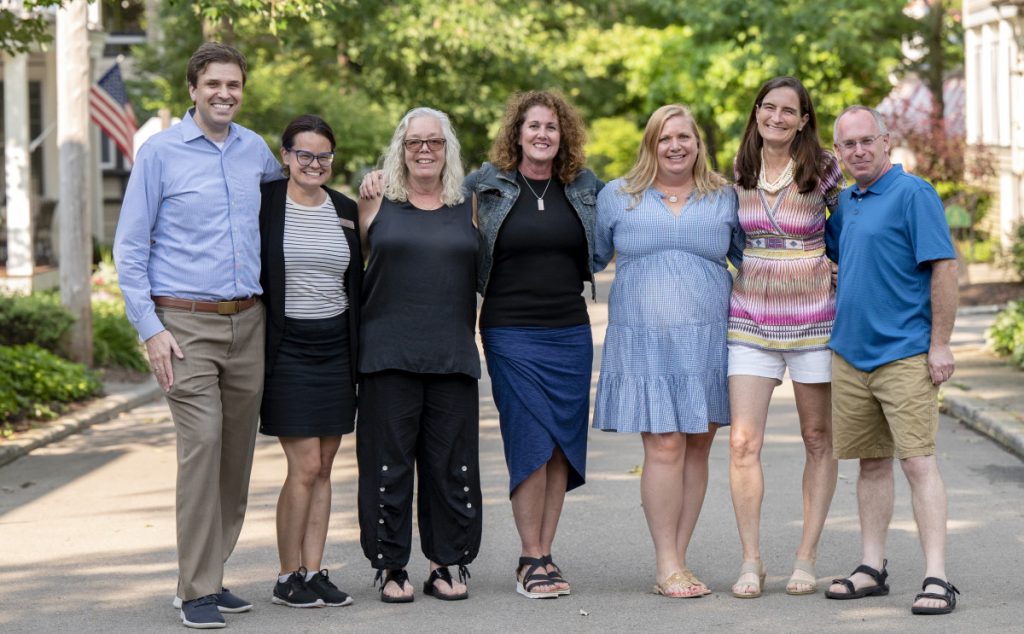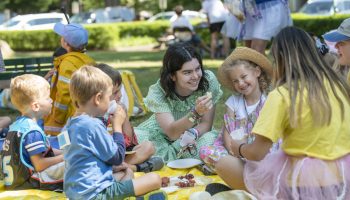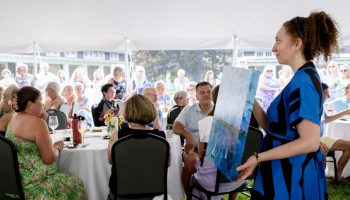SARAH VEST – STAFF WRITER

One rainy Wednesday morning, the Chautauqua Youth and Family Programs Advisory Group held its first on-grounds Listening Session in Smith Wilkes Hall. The purpose of the session was to hear from members of the community who might have children or grandchildren with special needs about what accommodations they would like to see at Chautauqua. The irony was not lost on anyone in attendance that the meeting was scheduled and held in one of the buildings in the Institution that is not compliant with the American Disabilities Act.
The advisory group was formed in March 2020 as a response to community concerns regarding changes that were going to be made to Boys’ and Girls’ Club, including an opt-out lunch program and making the groups coeducational.
Erin Cornelius — a member of the advisory group and lifelong Chautauquan — gives Chautauqua credit for putting their plans on pause and recognizing that community engagement and listening was clearly necessary.
The advisory group is made up of a variety of Chautauquans, including: Deirdre Anderson, Erin Cornelius, Stephanie Dawson, Laren Knoll, Bijou Clinger Miller, Jennifer Goldberg Rapoport, Kelsey Twist Schroeder, Ben Sorensen and Sally Struk, and seasonal Youth and Family Program staff Pie Kasbar, of Children’s School, and Alan Rubin, of Boys’ and Girls’ Club. Some of them grew up here and went all the way through the youth programs. Others have only experienced programming as parents. Some are past employees. The thing that ties them together is their love of Chautauqua and her youth.
“We each represent different segments of the community,” Anderson said. “We can help improve the Youth and Family Programs at Chautauqua.”
Their goal is to act as a resource and sounding board for Institution staff members as they consider and develop plans for Chautauqua Institution’s Youth and Family Programs. They have been working closely with Alyssa Porter, director of youth and family programs, and Matt Ewalt, vice president and Emily and Richard Smucker Chair for Education.
It is important to all of the advisory group members that Chautauquans know that they are all volunteers, and are not being compensated by the Institution in any way. They chose to be a part of this because they want to see Youth and Family Programs become something that everyone can enjoy, no matter who they are, where they come from or what their needs may be.
“Over the past year and half, the youth advisory group has played a critical role in listening to the larger Chautauqua community to better understand the role youth and family programs play in their lives and engaging one another as group members in open and candid conversation,” Ewalt said.
The advisory group says that they seek to serve every member of the Chautauqua community in order to enhance and improve their experiences with Youth and Family programming. They say that while they want to honor the Institution’s history and traditions, the primary focus is looking toward the future.
Since its inception, the advisory group has had monthly meetings between all the members, established a clear line of communication through their group email (yfadvisory@chq.org) and held numerous Zoom Listening Sessions where members of Chautauqua’s community were able to make their voices heard in a safe environment.
The Listening Sessions have had a total of 231 participants that represented 190 different Chautauquans between August 2020 and April 2021. The results of these sessions are being published in an interim report written by the advisory group titled “One Year Together: A Community Update.”
“I’ve been really inspired and just really happy with the way that the group has gone,” Porter said. “We don’t always agree on everything, and I think that if we did that would kind of defeat the purpose of this group. This isn’t a check-the-box, say-we-listen-to-the-community sort of group. It really is a sounding board and a place to get different perspectives on potential changes or challenges that we’re facing.”
In order to write this report, the members of the advisory group analyzed all the meeting notes from the Listening Sessions. It was clear that there was a range of experiences and preferences and in order to organize the ideas they identified a number of themes from the session notes and divided them by age group.
It was found that the youth of Chautauqua loved the lifelong friendships that youth programming enabled them to make, as well as the freedom and independence they are able to have while on grounds.
It was also found that the majority of youth that participated in the listening sessions expressed a preference for gender-based groups at Club because they believe they reduce stress related to puberty, body image, different styles of play and competition in athletic events. However, they also expressed a desire for less gender-typical scheduled activities. Girls wanted more opportunities to play sports, and boys expressed an interest in having more arts and crafts activities.
Almost all the youth participants agreed that all the Groupers have the right, and should be allowed, to choose their group based on gender identity.
Porter has connected with teens and young adults who attended the listening sessions to set up a dedicated advisory council for this demographic. One of the suggestions that has already been made is to leverage social media as a way to get Chautauqua’s youth involved with what’s happening on the grounds.
“There’s been a lot of talk about communication and how information is disseminated from the Institution to the community, and how the community then also has the ability to bring information back to the Institution,” Cornelius said. “Also, communication that meets different demographics — teenagers don’t communicate via Facebook.”
The list of things that adults love about Chautauqua is remarkably similar to what younger Chautauquans love. Both parties love the lifelong friendships that they have made on the grounds and the opportunities to make connections. One notable difference is that the adults expressed a love of the strong sense of history and tradition at Chautauqua.
“I think one thing that I’ve learned through being part of this group is that everybody’s tradition at Chautauqua is different. Everybody’s,” said Knoll, who is a mother of five. “You know there’s certain things that we all do, like Club, but is Club the tradition or is it the friends that we each had on our own? That’s the tradition. It’s just such an all-encompassing word that is thrown around a lot, but what does it truly mean?”
According to the report, there tended to be more conflicting opinions from the adults than the youth. In terms of changes made to Club groupings, some adults wanted to keep things separate by gender, others wanted to make the groups coed and some were open to forms of modifications that met in the middle of these two options. For example, including more regularly scheduled coed activities.
This isn’t a check-the-box, say-we-listen-to-the-community sort of group. It really is a sounding board and a place to get different perspectives on potential changes or challenges that we’re facing.”
Alyssa Porter
Director,
Youth and Family Programs
There were some semantic changes proposed that have already been implemented on the grounds for the 2021 season. The opt-out lunch program was changed to be an opt-in lunch program, so that families who are here for vacation can have the noon to 2 p.m. time block to spend time together. Other families who may be here for the season and are still working from home are able to keep their children engaged at Club and not have to worry about those couple hours of down time when their children might not get the most out of their day.
This solution is one of many others like it that have come from advisory group members, as well as members of the community.
“The creative solutions have been great,” said Dawson, who relocated her family from Atlanta so they could summer in Chautauqua. “It’s been so nice to be able to say, ‘Oh, well, this is a problem that we’ve been trying to solve. Here’s maybe our four ideas that we came up with — oh wait, here’s the 15 that the community came up with.’ ”
The advisory group is looking toward the future of Chautauqua’s Youth and Family programming. Clinger, who is a lifelong Chautauquan and was a bus monitor for Children’s School, said that what they really want is for the programming to be “sustainable.”
One of the ways that the advisory group is looking to do that is by being more inclusive to children with special needs. Children’s School has a good support system already in place, but Club is less accessible, according to the report. Parents of children with special needs expressed that having more accessible programming for their children would mean the adult programming would be more accessible to them.
The advisory board acknowledges that Club isn’t a good fit for every family, but if accommodations were made, it could be a good fit for more families. In addition to this benefiting the families of children with special needs already at the Institution, it could be a draw for first-time families to have a safe and inclusive environment to send their child. According to Cornelius, a psychologist, one in five children are special needs, whether developmental or physical, so it’s an issue that does have a large impact on the Chautauqua community.
Both Dawson and Anderson said when they look at Chautauqua they see two different parts. The first is the people and the second is the business, such as what it takes for the Institution to handle day-to-day operations.
In order for Chautauqua to continue to be what it is today, it is important to consider what solid Youth and Family programming can do for the Institution, according to advisory group members. Anderson points to generational Chautauquans who have gone through Youth and Family Programs, like Club, and have then returned as adults to give their children the same experience they had. By making programming more accessible to families, it is possible to secure the future of the Institution.
“One of the things I’ve been most struck by is the misperception of youth programming as being some moneymaker for Chautauqua,” Cornelius said. “Really, where I think that the next step is for us is that we need to have fundraising for youth programming. We’ve got the Opera Guild and Friends of Chautauqua Theater. We need Friends of Youth Programming. We need Chautauquans to understand where there’s some deficits, and help Chautauqua make youth programming as great as it possibly can be.”
One thing that all the members of the advisory group, including Anderson, pointed to was how it is necessary to “(balance) tradition with the inevitable and important need for evolution.” The group thinks balance is possible to achieve, and the report is an important step toward the Institution finding that balance while working with the community that they serve.
After the 2021 season wraps up the advisory group will be meeting with program leaders to offer guidance based on the information that they have gathered from the community since March of 2020 in order to prepare for the summer of 2022 and the following years.
“What we have now is we have a lot of stories and experiences from the community that we can learn from. We have to listen, we have to really consider what the community wants and needs, and we need to be looking to a future where the people we may be serving aren’t here yet,” Porter said. “If we can enhance our programs in a way that makes them more accessible and sustainable, that serves both our current Chautauquans, and the future of Chautauqua.”




